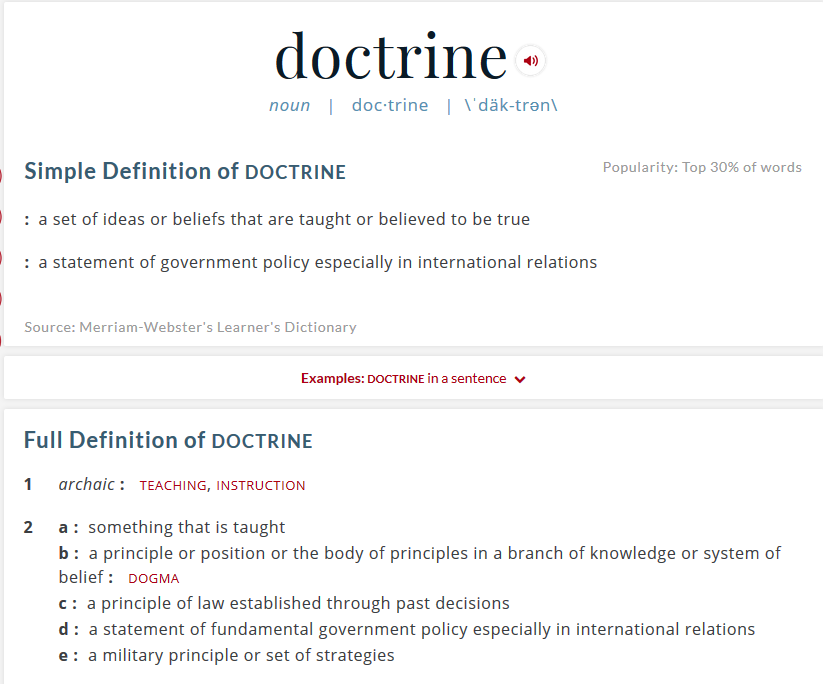First some definitions:



So for casual purposes we can say that on a continuum of certainty belief is less certain than doctrine is less certain than dogma. Theology covers all three but dogma is concentrated in documents such as the Confessions and Creeds while Catechisms are a bit broader covering communal beliefs through dogma.
1. Dogmatic interpretation of Scripture is used in two senses:
- negatively, to imply imposing a doctrine on Scripture to create an interpretation other than what the scripture actually says
- positively, to derive dogma from Scripture and then use that dogma as a lens through which we interpret all scripture.
If we are honest with ourselves, we recognize that we cannot escape dogmatic interpretation. I dare you to read the Bible without assuming a single God exists, Jesus is the Son of God (or messenger of God for a few of you), humanity is subject to sin ...
2. There is a circular relationship - the Scripture is the source of dogma; that dogma is used in interpreting the Bible. This is not a vicious circle - it is only saying that as we understand one element of Scripture, we use that understanding to verify and expand our understanding of other elements.
In a fair argument, this means that the negative meaning of "dogmatic interpretation" is lazy name calling. It really means one of the following:
- I don't accept the dogma you are utilizing as an interpretative lens. You most give me a subargument showing it is true i.e. treat it like any other presupposition that is not mutually agreed upon.
- I accept the dogma but believe there is an error in your logic trying to apply it to this passage. I must provide you with evidence of the error in logic i.e. treat it like any other fallacy.
3. Logos provides us with several Guide sections that can help us identify doctrine and dogma with specific traditions, identify the revelation supporting those doctrines and dogmas, and, less thoroughly, identify other passages interpreted through the lens.
In Verbum there are three Collections automatically included in a Passage Guide - Catechisms, Church Documents, Church Fathers. Different traditions within the Church place different weight on where Church Fathers fall on the certainty scale with the Western Church generally giving lower levels than the Byzantine and Oriental traditions. The certainty assigned the Catechisms and Church Documents varies by resource.

Much of the same information is provided by the Catholic Topical Index which also adds additional Scriptural support, Liturgy, Canon Law ... to the mix..

In Logos Now there are three sections Confessional Documents which are clearly authoritative, Biblical Theologies which are as authoritative as the accuracy of the interpretation and Systematic Theologies which utilize the full belief-dogma range.



For other Logos users, the Ancient Literature Section provides an index to the Church Fathers' use of a reference similar to the Verbum Collection rather than topical as in Logos/Verbum Now:

You may also make your own collections to parallel the Verbum default Collection sections; or you may wish to make such collections tailored to your needs that replace the default sections.
4. How to evaluate dogmatic interpretation:
- for any given interpretation, identify the underlying assumptions i.e. assume that the dogma used in an interpretation is rarely explicitly given
- is that assumption true in the sense of supported by revelation? I use this terminology to allow both sola scriptura and broader interpretations of supporting evidence but am deliberately assuming a Christian context.
- in the common case where you don't have time to actually test the support of revelation in its entirety, is the assumption given in a document which is accepted as trustworthy e.g. Nicene Creed, Heidelberg Catechism .. ...?
- if it is not in a documents accepted as trustworthy, is it supported by an appeal to an expert witness? (here the Commentary and Collection sections of the Guides become useful)
- then apply the standard criteria for evaluating the interpretative argument presented.
Some useful resources:
- Fowl, Stephen E. Theological Interpretation of Scripture. Cascade Companions. Eugene, OR: Cascade Books, 2009. (In Logos)
- International Theological Commission. The Interpretation of Dogma. 1989
- Carl E. Braaten and Robert W. Jenson, editors. Reclaiming the Bible for the Church. Grand Rapids: Wm. B. Eerdmans Publishing Co. 1995.